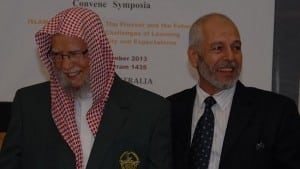A major Islamic organisation thrown into turmoil by an internal coup has been stacked with new executives that include two sacked school leaders and a halal certifier suing anti-Islam campaigner Kirralie Smith.

Fairfax Media reported on Monday that a group of former executive members of the Australian Federation of Islamic Councils
(AFIC), who either stepped down or were banned last year, entered the organisation’s Zetland headquarters late at night last week with a locksmith.
AFIC administers millions of dollars worth of halal certification, sits on $65 million worth of assets and runs six Islamic schools.
All six schools risked having their federal funding revoked after audits uncovered years of mismanagement, nepotism and financial impropriety by AFIC.
Hafez Kassem, who circulated a letter of voluntary resignation last year, now claims it was only temporary and he has “officially resumed my duties as president”.
Keysar Trad, who was elected unopposed to replace Mr Kassem in August, has not been able to enter the Zetland offices since last Monday.
The building remains occupied by the former members, who convened a meeting on February 11 and installed themselves as the executive committee and passed no confidence motions in all others, including Mr Trad.
Fairfax Media has learned that the new “committee” includes several people previously deemed to be central to AFIC’s mismanagement.
Refaat El-Hajje, who lasted six months as principal of AFIC’s Malek Fahd Islamic College in Greenacre, has been installed as secretary.
In a bizarre twist, he complained to the NSW government of “continuous AFIC interference and unethical behaviour” when he was principal in 2013 and said he was sacked because he started asking AFIC for financial transparency.

Mr Kassem’s new treasurer, Mohammed El-Mouelhy, now has access to AFIC’s million-dollar halal certification regime.
He is in the midst of a defamation case against Kirralie Smith, a senate candidate for Australian Liberty Alliance and the founder of anti-halal website, Halal Choices.
Farouk Kahn, who was sacked as the chairman of the Islamic College of South Australia in 2015, has been reinstated as vice-president.
“I know now that he was never properly terminated from that position,” Mr Kassem wrote in a statement released after the February 11 meeting.
He declared his new executive committee to be a “team that has considerable experience in managing organisations and represent the best chance for AFIC to implement proper governance … so that it can regain the respect of the community”.
“The days of the president … acting without proper consultation and proper process are gone,” he wrote. “I have learnt these lessons and want to make sure the mistakes of the past are not repeated.”
Insiders fear the group who took control of the offices now have access to sensitive documents and accounts as well as material central to several external investigations and audits.
AFIC is in the midst of a three-year financial audit by the Australian Charities and Not-for-profits Commission, which has threatened to revoke its charity status.
Federal funding for schools is also under review.
The Islamic College of South Australia lost its funding this month and about $19 million was withdrawn from Malek Fahd last year after a court upheld evidence that the school had been siphoning profits to AFIC through high rents and fake loans.
The NSW Supreme Court has been tasked with determining who runs AFIC after the former committee, led by Mr Trad, commenced proceedings on Monday.
They have demanded Mr Kassem and eight others stop purporting to be the executive committee and “immediately surrender” the Zetland premises.
The case returns to court on Wednesday.
Mr Kassem’s group claim Mr Trad’s committee were never legitimately voted in.
Mr Kassem did not answer calls on Monday and a security guard prevented Fairfax Media from visiting the Zetland office on Tuesday.
Most of the nine state and territory councils that make up AFIC have written letters saying they don’t support Mr Kassem.



